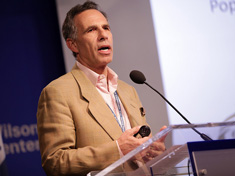-
Jack Goldstone: Preventing Violence in the Sahel Starts With More Inclusive Governance
June 5, 2015 By Carley Chavara
“The Sahel faces huge problems,” says Jack Goldstone, Virginia E. and John T. Hazel professor of public policy at George Mason University and Wilson Center global fellow, in this week’s podcast. “It is facing massive population growth. It is facing environmental decay. It has a history of violent conflict.”
“The Sahel faces huge problems,” says Jack Goldstone, Virginia E. and John T. Hazel professor of public policy at George Mason University and Wilson Center global fellow, in this week’s podcast. “It is facing massive population growth. It is facing environmental decay. It has a history of violent conflict.”
In the coming decades, Africa will have the only growing working age population in the world, says Goldstone. “The education, the socialization, the stability of young people in this region of the world is going to be, I think, the dominant issue for conflicts in the years ahead.”
As governments struggle to meet the needs of growing populations, young people and marginalized groups have become vulnerable to recruitment by extremists. In states already experiencing conflict or displacement, youth populations can be an even greater source of frustration as their potential is capped by limited livelihood options and their schooling is often cut short.
“If people come to trust the state and public institutions, they have less need to work through private networks”Effective governance can overcome these challenges through investments in education and health that allow fertility rates to decline and empower young people, giving them productive pathways to integrate with society. “As young people grow up feeling more in control of their own destinies,” Goldstone says, “they are more likely to turn to constructive group activities and less likely to be drawn to deviant or extremist movements out of anger and frustration.”
Goldstone says education, health, and security policies must be viewed as part of a holistic process. Improving secondary education requires many steps, including raising incomes so families can afford it, investing in tertiary schools to train teachers, and creating administrations that can secure and coordinate school supplies. Conflict undermines development as women and children are unable to attend health clinics and school for fear of violence. Likewise, displaced children “do not get the same educational progress that children do who grow up in their own home.”
“Population growth, education, and security are all deeply intertwined,” says Goldstone. “The cycle of stopping conflict requires a combination of investment not only in education and contraception but also in building governments that are inclusive, effective, and legitimate.”
“If people come to trust the state and public institutions, they have less need to work through private networks to get around the state or to protect their group at the expense of others.”
Jack Goldstone spoke at the Wilson Center on May 12.
Friday podcasts are also available for download from iTunes.
 A Publication of the Stimson Center.
A Publication of the Stimson Center.







